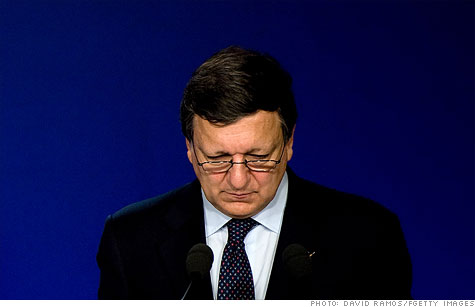
President of the European Commission Jose Barroso, seen here at a press conference earlier this month, is leading the charge to integrate Europe.
NEW YORK (CNNMoney) -- The debt problems in Europe have been so persistent and pervasive that the debt crisis is beginning to feel like the new normal.
It's been at least 18 months since the turmoil became a full-blown crisis, and many analysts say there is more pain to come.
"We are not out of the woods yet, and everyone is hoping that the eurozone can soon get its act together," IHS Global economists wrote in a note to clients.
Despite countless emergency meetings this year, European policy makers have failed to fully convince investors that the crisis will be brought under control anytime soon.
European Union leaders agreed on a series of crisis measures in October, after it became clear that proposals announced in July were insufficient.
But the latest rescue plan remains a work in progress, with the push to leverage a government-backed bailout fund apparently going nowhere fast.
As a result, it's unclear how the crisis will be resolved, leaving investors to grapple with the threat of a major meltdown in Europe.
Greece is still a disaster waiting to happen. Italy is in better financial shape, but that may not matter if jumpy investors continue to demand higher interest rates on Italian bonds.
Both nations have installed new governments that have pledged to implement reforms. But many investors are skeptical that new leaders in Athens and Rome will succeed where their predecessors failed.
Spain has also been under pressure as investors question the creditworthiness of basically every euro area government, even those with balanced budgets and comparatively manageable debt levels.
Even France, the second-largest eurozone economy and one of its core members, is now seen as vulnerable to the contagion.
By contrast, Germany continues to enjoy borrowing costs near record lows as investors habitually flock to the eurozone's largest economy for safety.
Meanwhile, the risk of a deep and painful recession in Europe is rising, as financial markets remain nervous about the future of the euro currency union.
In addition, the banking system in Europe is showing signs of cracking as lending continues to tighten.
All of this has put pressure on the European Central Bank to break with tradition and become the lender of last resort for troubled euro area governments.
The ECB has been intervening in the sovereign debt market on a temporary and limited basis since it reopened its securities market program in August. But investors want the central bank to commit to large and unlimited bond buying.
"Markets always want short, sharp, simple solutions. This is why the begging bowl is out for ECB unlimited monetization," said Bob Janjuah, fixed income analyst at Nomura Securities. "But, as in the immortal words of Messrs Jagger and Richards, 'you can't always get want you want.'"
The ECB has argued that unlimited intervention in the bond market would be illegal, since the bank is only mandated to "maintain price stability.' German Chancellor Angela Merkel, who holds considerable sway, is also opposed to expanding the ECB's balance sheet, since printing euros could lead to inflation.
Critics say unlimited ECB intervention would create a "moral hazard" by enabling governments to avoid making unpopular fiscal and economic reforms.
But supporters of central bank intervention say the ECB is the only European institution with the financial firepower to restore confidence in global markets.
The European Financial Stability Facility is the closest thing to a replacement for the ECB, but it is not sufficiently funded to support Italy's financing needs. The details of a plan to leverage its €440 billion up to €1 trillion have yet to be finalized.
"The only thing that would work is printing euros, paying down the debt and risking inflation," said Dave Rovelli, managing director of U.S. equity trading at Canaccord Genuity. "Merkel refuses to do either so we are going to have massive volatility in our markets."
Aside from the immediate crisis, experts say policy makers must address fundamental flaws in the way the European Union operates.
The problem, experts say, is that having a shared currency and common monetary policy is not sustainable without greater cooperation on economic and fiscal matters.
Some analysts have called for the creation of so-called Eurobonds, which would be issued on an EU-wide basis, as a way out of the debt crisis.
But steps towards "integration" across Europe could involve rewriting existing treaties and raise thorny questions about national sovereignty. As such, few expect officials to announce any concrete actions any time soon.
"In the future, we will need to go even further on strengthening integration," said Jose Barroso, president of the European Commission, in a speech to Parliament Thursday. "But let's not fool ourselves. Treaty change takes time and should not be seen as the immediate solution for the current crisis." ![]()
| Overnight Avg Rate | Latest | Change | Last Week |
|---|---|---|---|
| 30 yr fixed | 3.80% | 3.88% | |
| 15 yr fixed | 3.20% | 3.23% | |
| 5/1 ARM | 3.84% | 3.88% | |
| 30 yr refi | 3.82% | 3.93% | |
| 15 yr refi | 3.20% | 3.23% |
Today's featured rates: